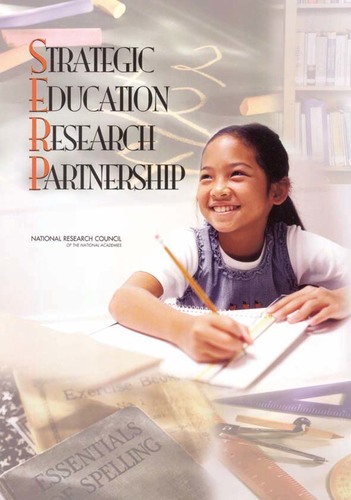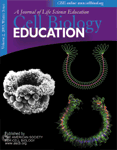From the National Academies
In this issue, I provide information about an ongoing activity at the National Academies1 that will be of direct interest to biologists who are working to improve education in the life sciences. I also describe a recently published report and a forthcoming report on the Academies' efforts to help the nation develop a coherent strategy for improving education research and for translating the burgeoning research about how people learn for education practitioners.
1The National Academies is a private, nonprofit organization whose charter is to assist the federal government and the American people in analyzing pressing science and technology policy issues. The National Academies include three honorific societies, the National Academy of Sciences, National Academy of Engineering, and Institute of Medicine. The National Research Council serves as the operating and research arm. Much of the work of the National Academies is performed by leading scientists, mathematicians, engineers, social scientists, and policy experts who provide pro bono service to the National Academies and the nation.
OVERVIEW OF TWO ONGOING ACTIVITIES AT THE NATIONAL ACADEMIES OF INTEREST TO CBE READERS
Summer Institute for Biology Faculty
The National Research Council's (NRC) Board on Life Sciences, supported by the Center for Education, is developing a multi-year series of summer institutes on undergraduate biology education. The idea emerged from the recently released NRC report, produced by a committee chaired by Lubert Stryer (Stanford University), entitled Bio2010: Transforming Undergraduate Education for Future Research Biologists (NRC, 2003a). The report called for an increased focus on the connections between biology and other sciences and an expansion in the use of inquiry-based learning, undergraduate research, and other alternatives to standard lecture courses. The authoring committee suggested that the goal of the Summer Institute should be to bring life sciences faculty together to work with each other and with other experts in teaching and learning to improve undergraduate education in biology. Faculty would focus on integrating current scientific research and appropriate pedagogical approaches to create courses that actively engage students in the ways that scientists think and in ways that are relevant to students' lives and future careers. The Summer Institutes would allow participants to consider a variety of approaches to teaching and to adopt and adapt those that might best complement their own teaching styles and work to convey the biological concepts they would like their students to learn. Faculty at research universities would be particularly encouraged to participate, as they are often underrepresented at national workshops on education.
During the past year, work has commenced to implement the Summer Institute. A steering committee has been selected, with William Wood (University of Colorado at Boulder and a member of the NAS) and James Gentile (Hope College, and a member of the authoring committee for Bio2010) serving as co-chairs. The committee and 25 faculty from research-intensive universities who are actively engaged in improving undergraduate science education met at the University of Wisconsin, Madison, in August 2003 to craft a plan for Summer Institutes that would begin in 2004. They also staged a pilot institute to examine the most fruitful approaches for subsequent Institutes.
Additional details about the August 2003 planning meeting and the 2004 Summer Institute are described in a meeting report by Wood and Gentile in this issue of CBE. Funds from the National Academies and the Howard Hughes Medical Institute supported efforts to hold the planning meeting and to organize future Institutes. Extramural funds are now being sought to support future Summer Institutes. For additional information, contact Kerry Brenner ([email protected]).
Recent and Forthcoming Reports on Learning
Strategic Education Research Partnership (NRC, 2003b). In the previous issue of CBE, this column described a workshop and report on improving student learning in science, technology, engineering, and mathematics (NRC, 2003c). That report and many other reports from the National Academies have noted the importance of collaborations between experts in the natural sciences and those with the appropriate expertise in education research. Federal agencies and private foundations have long supported education research programs that are designed to analyze and improve K–12 practices to raise academic achievement at all levels. Although much has been learned, this education research still has not penetrated classroom practice deeply enough to affect student learning significantly.
Strategic Education Research Partnership proposes a bold new research and development system to encourage researchers and educators to work together, closely linking education research to the schools. It recommends the creation of a “Strategic Education Research Partnership” (SERP) that would marshal scientific knowledge, financial resources, and the expertise of teachers (the “wisdom of practice”) to boost student achievement. As envisioned, the goal of this initiative would be to seamlessly weave education research and development with everyday practice in the nation's classrooms. Currently, researchers have few opportunities to study school practices up close. At the same time, educators seldom have the time or resources to scientifically analyze their own practices or to shape education research agendas. In addition, the budgets for education research and development generally are inadequate and unpredictable.

SERP is designed to provide a mechanism through which scientists, educators, and policy makers can create a vibrant partnership to support and sustain a coherent program of education research—systematically accumulating research-based knowledge, taking stock of what works and in what settings, and determining how to scale up effective approaches in teaching and in organizing schools.
As envisioned by the study committee, a central SERP headquarters would design and oversee a coherent program of education research, set long-term goals, pull together and disseminate findings, and pursue sources of funding. Most of the work, however, would be done outside the headquarters by teams of highly skilled practitioners and leading researchers in various disciplines. Much of the work would take place in schools and school districts across the country that volunteer to serve as SERP field sites. These sites would be akin to teaching hospitals in the medical profession. They would give top-notch scientists and practitioners a place in which to collaborate, defining and investigating major questions.
To take root and thrive, the initiative would require substantial investments. The cost to launch SERP and fund it throughout a seven- to ten-year start-up period is estimated by the committee to be about $500 million. That expense may seem high to some policymakers, given current state budget crunches and the meager funds traditionally allocated for education research and development. But it amounts to a very small fraction of 1% of state spending on elementary and secondary education (well over $300 billion annually).
This study was supported with funds from the U.S. Department of Education (Grant R305U000002), the John D. and Catherine T. MacArthur Foundation (Grant 00-61980-HCD), the Spencer Foundation (Grant 20030091), and the Carnegie Corporation of New York (Grant B7070). For additional information, contact Suzanne Donovan ([email protected]). The report (cited below) is available on the National Academies Press web site at http://books.nap.edu/catalog/10670.html.
How Students Learn: History, Math, and Science in the Classroom (NRC, in press). Getting students excited about history and persuading them that mathematical functions and science are relevant to their everyday lives are the kinds of practical challenges that confront every classroom teacher. The dilemma is addressed in this report by connecting recent research on cognition, teaching, and learning to the world of teachers. The report, designed primarily for teachers, builds on the discoveries detailed in the best-selling National Academies report, How People Learn: Brain, Mind, Experience, and School—Expanded Edition (NRC, 2000). Findings from the research literature are presented in this report in a form that teachers can use to improve their work in the classroom.
Organized for utility, the book explores how the principles of learning can be applied in teaching history, science, and math topics at three levels: elementary, middle, and high school (many of these strategies are also relevant for teaching introductory-level courses in college). Leading educators explain in detail how they developed successful curricula and teaching approaches, presenting strategies that can serve as models for curriculum development and classroom instruction.
The book explores the importance of balancing students' knowledge of fact in history with their understanding of concepts, such as change and cause, and their skills in assessing historical accounts. It discusses how to build straightforward science experiments into true understanding of scientific principles. And it provides examples of how to support students' conceptual understanding of mathematics so that their procedural skills are accompanied by mathematical insight and reasoning skills.
The development of this companion volume to How People Learn was supported with funds from many individuals and companies. For additional information, contact Suzanne Donovan ([email protected]).
ACKNOWLEDGMENTS
I thank Bruce Alberts, Suzanne Donovan, Fran Sharples, Kerry Brenner, and Adam Fagen for reviewing and commenting on an earlier draft of this article.



